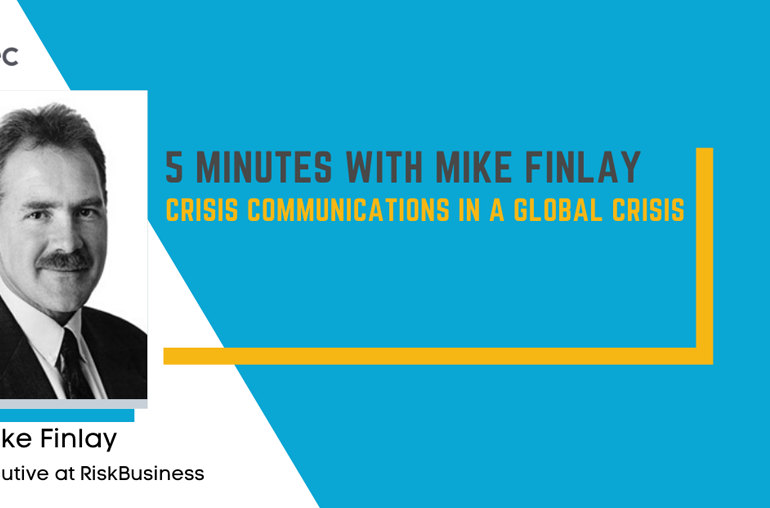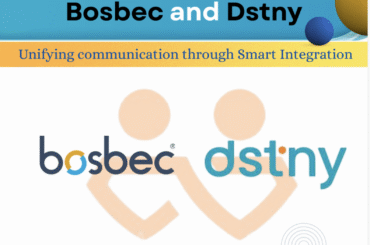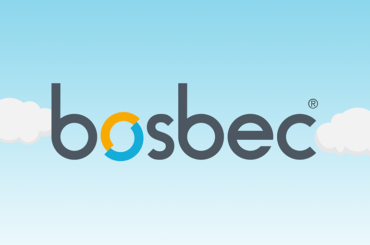We had an opportunity to catch up with Mike Finlay who is Chief Executive at RiskBusiness, a risk solutions business located in the United Kingdom. We sat down to have a chat about Covid-19, communication during a crisis, what risks and opportunities lie ahead and the – very valid – reasons why you shouldn’t treat your customers like mushrooms.
Welcome Mike, we’re so happy that you could make it. Tell us briefly about your company and what you do!
RiskBusiness have been a risk solutions business since 2003. We focus primarily on technology, risk content and advisory services and our clients are mainly in financial services – banking, asset management and insurance. We also do a lot of thought leadership through white papers and similar as a way of helping to move the industry forward.
Let’s crack on with our questions. During the times that we are living in right now, what do you believe is the biggest threat to your clients and the financial world in general?
The biggest issue is obviously business interruption and the fact that companies cannot deal with business as normal because of the various circumstances that they are in. Moving slightly further forward, as we come out of the crisis, the biggest issue is going to be fraud – fraud which has not yet been discovered as well as fraud throughout the recovery cycle. Within a long-term perspective the biggest threat is obviously going to be a protracted recession. When economies all over the world have ground to a halt, getting them started again is going to take a long long time.
How do you believe that a company can mitigate their losses and consequences in a crisis like this?
So I think there is a couple of perspectives on this one. Number one – you need to have an appropriate recovery plan. How do we migrate people working from home to returning to work in an office? How does information and data that now perhaps is sitting on home networks get removed and returned to the office? You need to have a comprehensive recovery plan to establish how you are going to get back up and running and then how you are going to run in the new world we are going to face. Number two – what is the new future for everyone? Are firms simply going to pick up the pieces and head in the way they are used to or are they going to streamline, reduce headcount and move into a partial working from home type of environment? People are going to have to address that because the world has quite simply changed and we can’t just go back to the way we used to be doing things.
Crisis communication is vital – what do you believe is important to think about both for internal as well as external communication?
Providing adequate information on a timely basis. You need to be keeping your staff, customers, clients and regulators aware of where you are and where you are going. One of the first things we did as a firm was to send out a paper to all of our clients detailing exactly what our preparation plans were and how we will continue to support them throughout the crisis. That initiative was incredibly well received, simply because we bothered enough to include our clients for the road ahead. There’s an old saying: don’t treat people like mushrooms, i.e – don’t keep them in the dark and feed them – put bluntly – lots of shit. Rather, keep them involved and well-fed with wholesome and appropriate information to encourage continued flourishing even during hardship. I also believe that people have become more critical about what you read about on social media and I’ve also seen a growing demand for the truth. People are more concerned about the sources of the information, which is why it’s also critical to keep your people informed with regular updates and as quickly as you can.
We have seen a rise in online services and companies such as Amazon, Zoom, Netflix. Many other companies have also taken refuge online to sustain their livelihoods in a time where we are unable to move as we normally would. Digitisation and quick adaptation to current situations has become more vital than ever. Do you see any potential risks that people should be aware of when our lives become more and more digital?
One risk is electronic fraud. The more everything becomes digital, and the more the various digital sources are interconnected the easier it is for fraudsters to find an entry point to either steal your data or alternatively obtaining your data to misuse it in some shape or form. Another concern for me is essentially the breakdown of traditional communication patterns and interaction patterns. The rise of digitisation, our reliance on devices and the rise of online shopping – especially now during Covid-19 – is changing our consumer and our personal communication behaviour significantly. I believe that the way we interact both on a professional and personal level will change from the ground up as a consequence of the pandemic.
Despite the obvious tragedy that people are falling ill from the disease and people all over the world are losing their jobs, can you see any silver linings emerging during this period?
I believe the rise of the community, and being proud to be part of a community is one positive aspect. Thinking about other people as opposed to being completely individualistic is a fantastic reaction that we have seen. Also the environmental benefits – less pollution, reduced air travel, less human impact on the environment.
Some people have said ’don’t let the cure become more lethal than the virus’ – what risks do you see from lengthy lockdowns and a receding economy?
Obviously the one risk that it refers to is the global recession and the damage to the economy. But I think the other major risk to me from a prolonged lockdown is on the mental health of individuals. From a mental health perspective it’s going to leave a lot of scarring in a lot of people. Young children between one, two years old where interaction with other children is so critical for their long term development. That’s where we learn how to be social animals, that’s where we learn how to communicate, that’s where we learn how to share and so on. If there are a bunch of kids that for four or five months in their critical stage are denied that sort of interaction, what consequences is that going to have for the adults in the future? I think the mental health aspect of this across the population from the very youngest to the old is the big issue.
What can we learn for the future beyond the crisis?
I think there are some firms that have used this period during which they might have a bit more time on their hands to undertake various levels of either business review or more in depth strategic changes. Can we cope through a remote working environment? Do we need all of the bureaucratic activities that tie up so much of everyone’s time when we are probably proving right now that we can survive without that type of activity? I think there will be quite a lot of re-engineering of process and engineering of the way people do things. I also believe that people need to be prepared that we are going to have more business disruption in the future – whether it being pandemics, consequences of climate change or anything else – and we should use this time to lay the groundwork and prepare for a higher level of business continuity in the future.
When the crisis is over – do you believe that society will return to normal or do you believe there will be a new normal?
So the optimist in me says that there will be a better world with less environmental damage. The realist in me says – never mind being inherently lazy – man is inherently greedy as well. And it won’t take us long to pick up all of our bad habits. Unfortunately I believe that this period of people being compassionate and caring for each other may be a short lived period, and it won’t take long for people to return to their normal behaviour.
What do you believe is the most important lesson to bring from this crisis?
I suppose it is preparation. From a business perspective, you have to think the unthinkable. And maybe challenge some of what we take for granted. If you own a coffee bar, what happens if I don’t have clients to sell my coffee to? And really start thinking about it from the perspective of what could stop that from happening, what’s the likelihood of something like that actually occurring. And if it did occur, how would I respond?
Lastly. What is your personal view on the future that lies ahead?
I suppose the most we could hope for is a return to normality – but hopefully a return to normality tempered slightly by gradual awareness of the environmental damage that we cause. For me that would be fascinating and fantastic. However, I’m concerned that the damage to the economy may preclude a lot of that happening too quickly. A very simple example – PPE has become a global necessity where every country in the world currently has an urgent demand. But the vast majority of PPE is single use plastic. What is happening to all of that single use plastic after it’s been used? So although I’d love to see it all honey and roses and sweetness I think the scars and the economy of things are going to be a bit of a grey cloud over us for quite a long time.
Let’s hope that your optimistic future scenarios will materialise and that we bring vital lessons on crisis management and communication into the future. A huge thank you, Mike, for an interesting talk.



